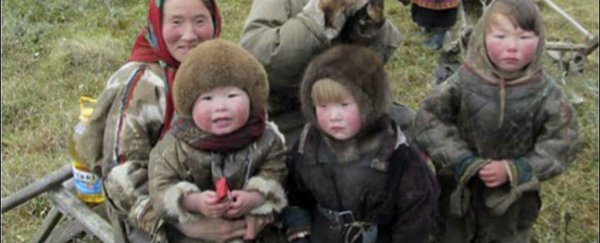Researchers have noted the first signs of obesity in the native ethnic groups of the Yamalo-Nenets region - an autonomous district that sits on the coast of the Arctic Ocean in Northwest Siberia.
According to local experts, obesity has not previously existed in these indigenous populations, but the first cases are now being reported, and a marked change in diet - including instant noodles and pasta - appears to be responsible.
"It never happened before that the small local indigenous peoples of the north suffered from obesity. Now even a predisposition to obesity is being noticed," Alexey Titovsky, regional director for science and innovation in the Yamalo-Nenets Autonomous Okrug, told The Siberian Times.
The Yamalo-Nenets Autonomous Okrug has a population of just over 522,000 people, whose ancestors have survived the permafrost for millennia.
The nomadic Nenets and Khanty peoples have been herding reindeer up and down the Yamal tundra - a 700-km-long peninsula that stretches deep into the Arctic Ocean - for 1,000 years, with diets heavily based on venison and fish.
But that appears to be changing fast, as researchers note the increasing uptake of chemically processed foods, such as instant noodles and pasta, and the addition of sugar, pastry, and bread to their diets.
According to Titovsky, these changes - which have only been occurring over the past few years - have seen the intake of venison and river fish cut by half.
The change in diet could simply be due to convenience - in recent years, villages in their pasture routes have started to stock processed foods, and their ease of preparation would surely make a big difference to reindeer herders with a big family to feed back home.
"This food is easy to transport, easy to make," notes Andrei Lobanov from the Department of Ecological Monitoring and Biomedical Technologies at the State Public Institution of the Yamalo-Nenets Autonomous Okrug.
"The problem is that carbohydrates do not contain the necessary micro elements, which help survival in Arctic conditions. The seasonal diet has also changed - the periods when they do not eat traditional food and replace it with carbohydrates has become longer."
The change in diet also appears to be a side-effect of the Nenets and Khanty groups' recent shift towards shorter, more circular pasture routes - they now cover only half the distance that they did 25 years ago, and tend to stick closer to the oil and gas settlements on the peninsula.
This close contact with the settlements has facilitated venison and antler trade with nearby countries in the south-east, which provides yet another incentive to move towards the villages and limit their traditional nomadic routes.
"They … want to use benefits of civilisation - to go to the shops, have good mobile connection, solve some issues with officials quickly. These are pure economic reasons," Lobanov told The Siberian Times.
But that also opens up the opportunity to shift their diet to more processed foods, and, strangely enough, the potential obesity problem isn't due to their inability to digest it like western cultures can - they're almost too good at digesting it.
"The indigenous can digest carbohydrates and sugar in particular. They can digest maybe even better than Europeans, and this causes the problem," says Lobanov. "The volume of consumed carbohydrates increases significantly. They replace their traditional food with them."
We should note that these obesity cases have not been published in a peer-reviewed journal, so we have to take into consideration that these appear to be very early observations of what could be a developing trend in the region.
But a recent investigation into the health of indigenous people all over the world did find that at least half of the populations are now dealing with high proportions of child and adult obesity due to a change in diet.
It's a concern, and not just because it could affect the weight of these groups - a 2015 study that saw 20 fast food-loving Americans swap diets with 20 rural South Africans resulted in some "remarkable" changes in the biomarkers that indicate colon cancer risk.
The shift is definitely something researchers in the Yamalo-Nenets region will be keeping a close eye on, but the good news is it's not something the locals are ignoring.
"Locals are interested very much in a balanced diet," Lobanov told The Siberian Times. "They see the problem and seek advice."
